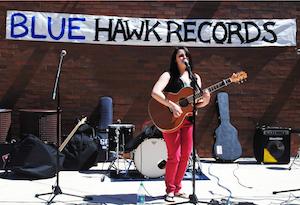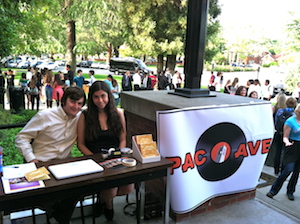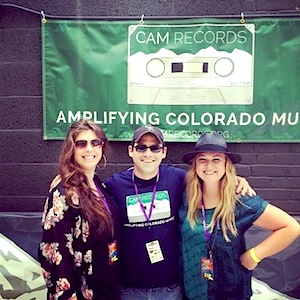Student-run record labels at college-level music schools provide real-world opportunities for students. They operate like major label companies, thanks to the high-powered music industry backgrounds of the faculty involved. The skills learned and the experiences gained are essential training for anyone interested in a career in music industry, as well as for anyone wanting to get their own music heard and distributed.
“A current day music industry program requires a perspective beyond the traditional industry functions,” says Joe Rapolla, who heads the Music Industry program at Monmouth University, home of Blue Hawk Records. “As music, media, and technology continue to converge, training needs to go beyond preparing students for jobs in music-only environments. It must go across media categories, and anywhere organizations are looking for creative people who understand the issues and models of current day media consumption and who know how to produce and utilize entertainment media to reach and engage.”
With music distribution changing so rapidly, what can students learn?
“We learned first and foremost that the traditional approach to a record label’s job in the music industry is dying hard and fast,” says Ethan Bates, a 2014 Music Industry graduate of Syracuse University Setnor School of Music. Bates had originally joined Syracuse University Recordings (SUR) to record some of his own music. He found the work so interesting and relevant to his career goals of managing and promoting music that he stayed on to become general manager of SUR in his senior year. “We found success by getting our hands dirty with jobs that a standard record label normally doesn’t involve itself with, like PR, social media marketing, show booking & promotion, etc. It allowed me to experience working from both sides of the desk, and from the perspective of numerous other jobs within the music industry.”
Kevin Guico, a 2014 Music Management graduate of the University of the Pacific Conservatory of Music, worked with his school’s Pac Ave Records to gain experience and see whether he’d want to incorporate record label operations in his career. “Pac Ave Records is run more as a business and a job rather than as a conventional class. As a student, you get to learn academically about the record industry and its operations first-hand. As an entertainment industry worker, you gain experience and knowledge from actually working in the industry. You learn exactly what goes into getting talent, recording an album, making the album, and distributing and selling it. Whether you are a performer or a businessman, working with a student-run record label gives you invaluable experience on both sides of the coin.”
Split Rail Records at Appalachian State University Hayes School of Music has offered Music Industry Studies senior Greg Peterson a chance to prepare for what he’ll do once he graduates. With a focus in Marketing and Management and a minor in Business, he’s taken on the role of “frontman” of Split Rail’s marketing team. “We work to promote our events, artists & bands, along with fundraising,” he says. “I speak with companies and local businesses about promoting. I also handle all graphics for Split Rail, so I make posters, logos, and other images for our events to help with brand and event recognition.” Peterson, who plans to become a festival manager and promoter or a producer for an entertainment company, is getting plenty of experience working with local artists and bands. “We look to sign local artists of any genre and style,” he says, “and give them the opportunity to have a professional album recorded and promoted by our team.”
Andrea Petrucelli is president of CAM Records (College of Arts and Media Records), a component of the University of Colorado Denver’s Music Entertainment Industry Studies (MEIS) program. Expecting to graduate in May, 2015 as a Music Business major, her many career goals include working in A&R, music journalism, concert promotion, management, and music education. In her major, participation in CAM is required and “provides a real taste of what it is like to work in the industry via communicating with other colleagues, artists, press, and venues.”
At Monmouth University, Natalie Zeller heads the Outreach Department for Blue Hawk Records. A junior in Music Industry, she promotes the label both on and off campus. “Working with Blue Hawk Records has taught me how to navigate the advances in technology that the music industry is seeing. While creating our compilation CDs I saw the process of our music being put up on iTunes and Spotify, two huge factors in buying and streaming music that people use every day.”
Professional Support
Faculty advise and support student efforts at these record labels every step of the way. With their backgrounds in music industry as professional musicians, recording engineers, marketing directors at major record labels, entrepreneurial consultants, and managers of music groups and talent agencies, these professionals offer their students a wealth of wisdom and real-world experience. At the same time, students get to make the kinds of decisions they’ll face in their work after graduation. Phillipe Ravenas, Chair of the Arts Entertainment & Media Management Product (AEMMP) at Columbia College Chicago, works with the oldest U.S. student record label, founded in 1982. He says, “Hands-on experimentation is at the heart of what we do. The process is the final product. This is a real training ground for students: a safe place to fail, to test the limits, to measure the consequences.”
Keith Hatschek, Music Management Program Director at the University of the Pacific Conservatory of Music, agrees. Pac Ave Records’ purpose is “to provide a lab for students to test out what works and what doesn’t in terms of choosing, producing, releasing and promoting recorded music and events. Purchasing, operations, marketing, artistic and creative decisions are basically all made by the students. If money or contracts are involved, those are run by the instructor to get relevant feedback.
“Ultimately, unless a question of legality or propriety comes up,” Hatschek continues, “the students make nearly all decisions relating to the label and its operation. Mistakes and successes count equally in this type of learning. Analyzing student decisions and their effectiveness forms the basis for much of the learning that transpires.”
Bob Halligan teaches in the Music Industry program at Syracuse University Setnor School of Music and works with its two labels. “They are meant as learning laboratories for today’s 360 music business,” he says. In addition to preparing students for jobs in industry, “we try to give people tools for inventing their own jobs if they can’t find more conventional ones.”
Opportunities for Students
Experience working at student-run record labels can be parlayed into exciting opportunities and internships, as well as jobs after graduation.
- This past summer, Blue Hawk Records students performed and toured in Italy. “During the trip,” says Joe Rapolla, “our students rehearsed and collaborated with students from a music academy in Italy and held live performances to sold-out audiences in beautiful medieval villages throughout the Abruzzo region.”
- “One of the goals of the label and class is to give students the opportunity to interact with the artist and build relationships,” says Andy “Rok” Gurerrero, who oversees students at UC Denver’s CAM Records label. “Last semester, we worked with the Colorado-based band “You, Me & Apollo” and helped sell out the release show at the Bluebird Theater (600 cap room).”
- “The very first album released by Pac Ave,” says Keith Hatschek, “was recognized by DownBeat magazine as the best collegiate recording of the year for 2012.” Some students who’ve worked with the Pac Ave label have gone on to executive positions at companies including Clear Channel radio, Pandora, Beats Music, and Warner Music Group.
- “Many have used real-world experience gained through the label to land internships,” says Kim Wangler. She oversees Split Rail Records at Appalachian State’s Hayes School of Music, where Split Rail is a required one-semester class for Music Industry Studies majors. “One of our (Split Rail) presidents got an internship in the legal department of MTV because she could talk about signing contracts with artists…We also brought in two publishers from Nashville. From that event, they discovered one of our students and he is now signed to a publishing contract with them and regularly visits Nashville to co-write with various artists.”
Takeaways
“Create tangible goals and a schedule to complete them. The fact that we had these goals and had deadlines for them held us accountable and focused on helping the label succeed. And always record everything. This not only helped us look back at our meeting notes whenever we needed a reference, but it also served as a compelling selling point. If we were trying to pick up another artist, we had tangible data on how we helped promote our current artist’s social media and record sales.”
— Kevin Guico
“A class that takes us out of the classroom environment and puts us right in the middle of the industry is the absolute best way to get our feet wet as college students. It is the real-life experience that is the biggest takeaway: record label operations and departments, the legalities, the local scene, the people to know in the local scene, networking, communication with difficult people, communication with easy people, dealing with a 5-piece band, how to pick a band, time management, budgeting, being punctual, how to work with each other, all of it.”
–Andrea Petrucelli
“Working at the AEEMP record label provides entrepreneurship, leadership, collaboration, and decision-making experience.”
– Phillipe Ravenas
“(At Split Rail Records) students get to talk about working with musicians in the studio, the trials and tribulations of launching an album on time, putting on release shows, seeking sponsorships, and more. I think this is a really great experience for our students – they deal with the real world of working with artists…not just what I can teach them in the class. They also have the pride of helping artists reach the next level in their career and a much better idea of actually working in, not just talking about, the music industry.”
– Kim Wangler
“One of the other interesting outcomes that students learn by taking the class is just how hard it is to stick to deadlines and how quickly the semester flies by. It’s a taste of how fast things must move in the post-graduation music industry and alerts them that time is of the essence in any business venture.”
– Keith Hatschek






Leave a Reply